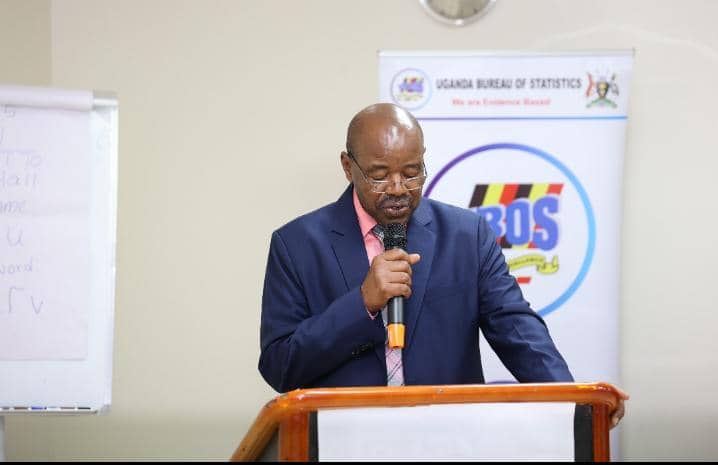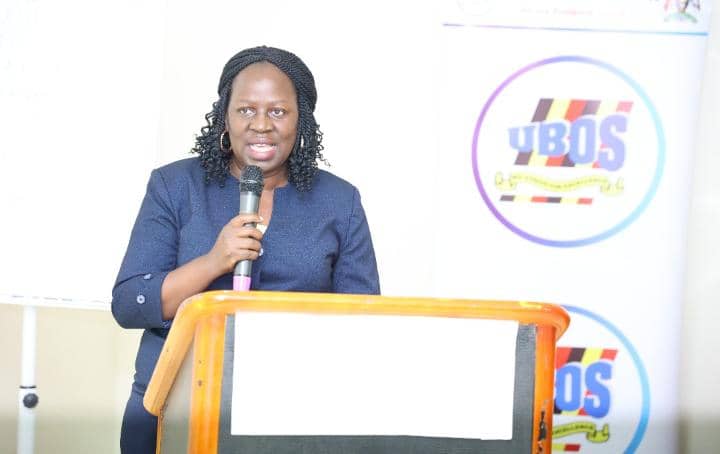
 Tiger FM
Tiger FM

 Tiger FM
Tiger FM
16 May 2025, 10:25 am
By Ronald Ssemagonja
The Uganda Bureau of Statistics (UBOS) is legally mandated to conduct all forms of national statistics. It is against this background that they conducted the Uganda National Household Survey 2023/2024. Yesterday, at Hotel Africana in Kampala, the report was officially launched.
During the event, the Minister of State for Finance, Planning and Economic Development, responsible for Statistics, Amos Lugoloobi, commended UBOS for successfully completing the exercise. However, he raised some concerns that need to be addressed, particularly regarding regions still struggling with poverty, such as Karamoja. He emphasised the importance of ensuring that people in these areas benefit from government programmes aimed at improving household incomes.
The main objective of the Uganda National Household Survey 2023/2024 report is to provide vital statistics on household socioeconomic characteristics, which help shape data-driven policies, monitor poverty, and guide development interventions across the country.
“Let us not waste the momentum. We have made progress, but we must leave no Ugandan behind. Let this data guide our actions, strengthen our partnerships, and energise our commitment to equitable, inclusive growth. With this data available, we have also been able to mainstream the Sustainable Development Goals targets into our National Development Framework to ensure that government investment principles work for the people—i.e., Wananchi. Development is not about data alone; it’s about a mother accessing healthcare, a youth getting a job, a child finishing school, a farmer earning from the land. Data must translate into real change in people’s lives,” Lugoloobi said.
The Minister also noted that, although the government has made efforts to reduce poverty, the statistics for Karamoja remain alarming. Nevertheless, the government is committed to continuing its work to ensure that nearly all people in the Karamoja region can participate in the cash economy.

The Minister went on to state that between 2019/20 and 2023/24, Uganda’s national poverty rate declined from 20.3% to 16.1%, confirming that this is not a small change but a major shift affecting millions. It reflects growing trust in commercial farming, education, and inclusive models such as the Parish Development Model.
“Yet, we must not rest. Karamoja’s poverty rate remains at a shocking 74.2%. Other regions, like Bukedi and Teso, are also struggling. We need targeted investment, smart policies, and strong leadership to bridge this gap,” he said.
Albert Byamugisha, Chairperson of the Uganda Bureau of Statistics Board, said that the National Household Survey Report 2023/24 aligns with the Uganda Bureau of Statistics Act, which mandates the Bureau to collect, analyse, and disseminate quality official statistics for the country.
Meanwhile, the Executive Director of UBOS, Chris Mukiza, thanked the Government of Uganda, through the Ministry of Finance, Planning and Economic Development, for funding this crucial exercise.
“I wish to thank the Government, through the Ministry of Finance, Planning and Economic Development, for funding the implementation of the Uganda National Household Survey 2023/2024. Data must remain at the heart of Uganda’s development. I am confident that the insights generated will stimulate informed debate and support the achievement of our national development goals,” he said.
While presenting the survey findings, Sharon Apio, Head of the Department of Demography and Social Statistics, highlighted that the survey represents a continued commitment by UBOS to produce high-quality, nationally representative data at regular intervals.

“Since the first survey in 1999/2000, the Uganda National Household Survey has served as a cornerstone of Uganda’s statistical system, conducted every three years to monitor socioeconomic dynamics across the country. The primary objective of this survey is to collect comprehensive demographic and economic data to inform policy decisions, track development progress, and support national planning frameworks such as Vision 2040, the Third National Development Plan (NDP III), the Sustainable Development Goals (SDGs), and the African Union’s Agenda 2063,” she said.
The event was attended by participants from various disciplines and was well received.
The report was designed with inclusivity and statistical rigour at its core. A total of 17,350 households were surveyed across 1,735 Enumeration Areas (EAs), selected using a sampling framework based on the 2014 National Population and Housing Census. The sample covered 14 sub-regions and three special strata for refugee and host communities in Western Uganda, Northern Uganda, and Kampala, ensuring comprehensive coverage of vulnerable populations.
Enumeration Areas were chosen using probability proportional to population size, followed by systematic listing and the random selection of 10 households per EA. This methodological precision, combined with the use of modern Computer-Assisted Personal Interviews (CAPI), enabled UBOS to achieve a 92% response rate, guaranteeing both the quality and national credibility of the findings.